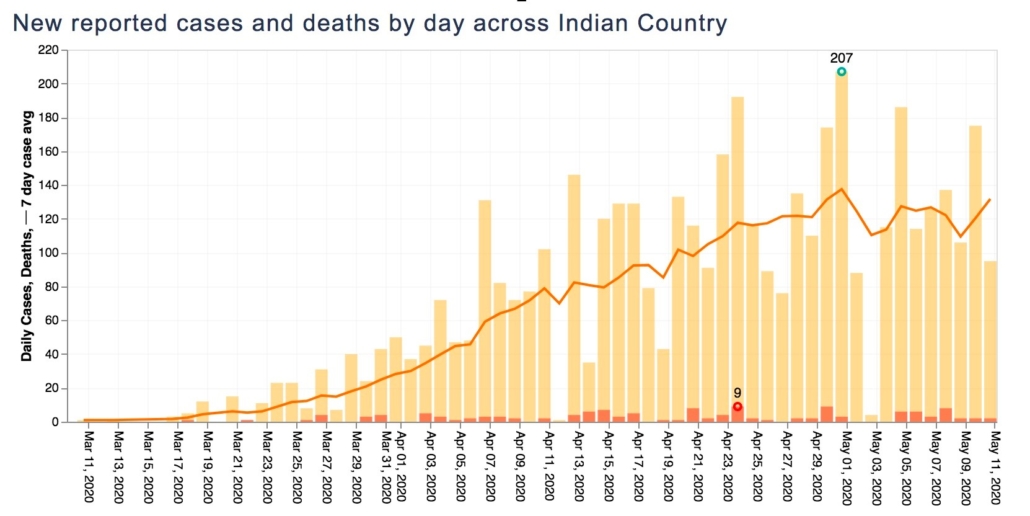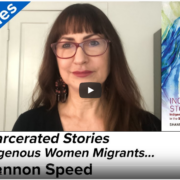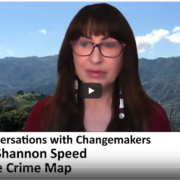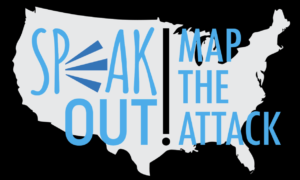As many states begin to reopen after the coronavirus shutdown, American Indian communities are reporting some of the highest rates of COVID-19. With Professors Randall Akee, Shannon Speed, and Desi Rodriguez-Lonebear as the lead researchers, UCLA’s American Indian Studies Center (AISC) and the Ralph J. Bunche Center for African American Studies are working to comprehensively document the disparate impact of the pandemic on Black, Indigenous, and other historically marginalized communities. They have created this publicly-accessible resource where the COVID-19 cases and deaths can be tracked by tribal nation and states on a weekly basis.
Dr. Mishuana Goeman (Tonawanda Band of Seneca), Associate Professor of Gender Studies, Chair of American Indian Studies IDP, and Special Advisor to the Chancellor on Native American and Indigenous Affairs, discussed the importance of this project and shared the following with LA Social Science:
“The AISC and our faculty at UCLA care deeply about serving American Indian Communities. Our expertise in research combined with communities needs to do what we do best in mapping the [COVID-19] data in AI communities—provide reliable and important information that enhances solutions to our most difficult and current issues we face. The data on American Indian communities is often sparse and inaccurate, this project is exemplary in the Data Sovereignty movement where UCLA has strong leadership by Randall Akee and Desi Rodriguez-Lonebear who represent us on the global level.”

Professor Akee, one of the lead researchers, told LA Social Science the following about the project:
“This is work that is based off of data that an online newspaper called Indian Country Today has been collecting and verifying by tribal reservation affiliation or location for American Indians and Alaska Natives that are reported to have COVID-19 as either a case of death. It was our idea at the Bunche Center and American Indian Studies Center to put this into a usable format (graphically) for others that might be interested in this topic at the reservation-level. Thus, these figures, to the best of our knowledge [are] the only depiction of the progression of cases at the tribal/reservation-level for American Indian and Alaska Natives. We’ve all seen the state graphs and those for other countries, but this is the first for these tribal governments. it is hoped that we can continue to update this weekly with their data and this may be useful for administrators in these communities.”
To learn more about this tracking resource and to check out the interactive graphs, click HERE.
Subscribe to LA Social Science and be the first to learn more insight and knowledge from UCLA social science experts in upcoming video/audio sessions and posts about current issues.
 Dr. Shannon Speed, citizen of the Chickasaw Nation of Oklahoma and director of the UCLA American Indian Studies Center and professor of Gender Studies and Anthropology, recently received the President’s Award from the American Anthropological Association (AAA) for her work bringing together scholarship and activism in advocating for Indigenous and Native American women. This award is given annually to encourage and reward an AAA member’s excellent contributions to the anthropological field.
Dr. Shannon Speed, citizen of the Chickasaw Nation of Oklahoma and director of the UCLA American Indian Studies Center and professor of Gender Studies and Anthropology, recently received the President’s Award from the American Anthropological Association (AAA) for her work bringing together scholarship and activism in advocating for Indigenous and Native American women. This award is given annually to encourage and reward an AAA member’s excellent contributions to the anthropological field.






